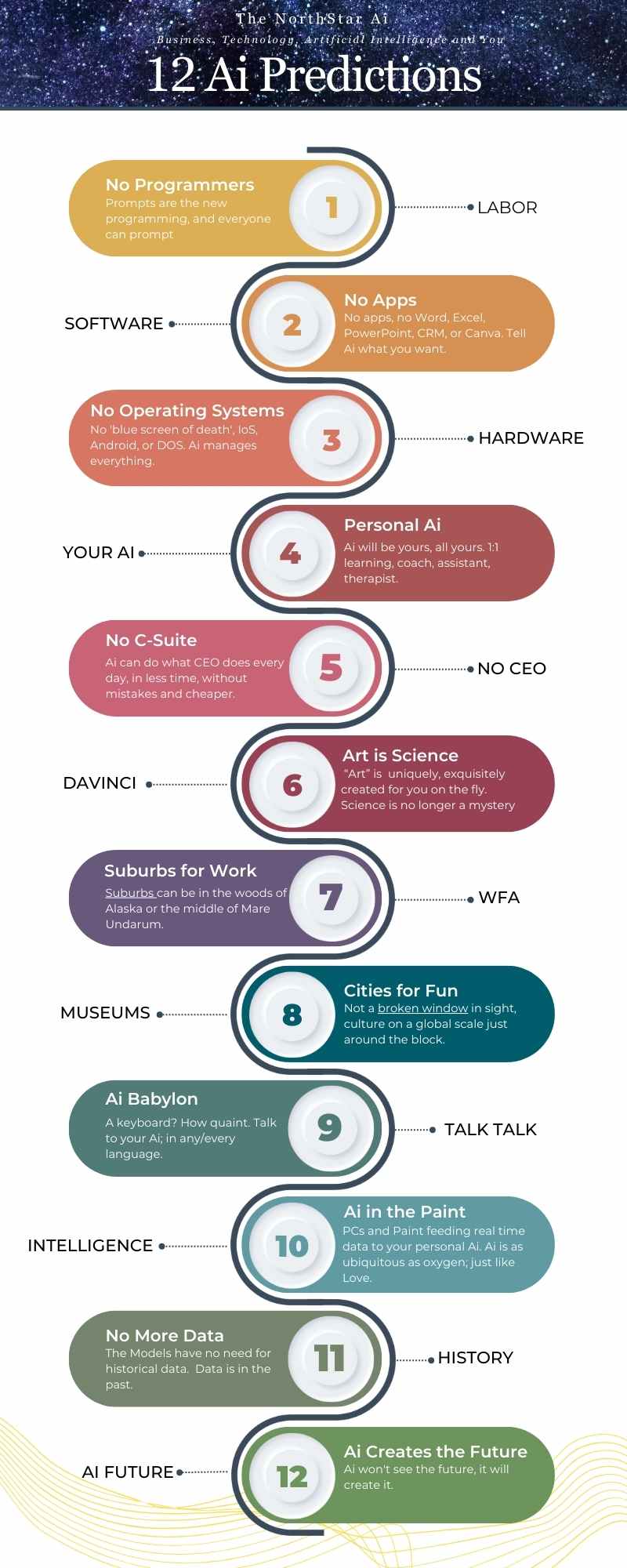 By Greg Walters. Ai can do what your VP of HR, and CEO does every day, in less time, without mistakes and cheaper. ## UPDATE ## 5/30/2024 "See, I told you so." New York Times supports "Ai Prediction #5 The Predictions are getting clicked off. Is The New York Times a NorthStar reader or is the Universal Conciseness upon us? "The chief executive is increasingly imperiled by A.I., just like the writer of news releases and the customer service representative." "This is not just a prediction. A few successful companies have begun to publicly experiment with the notion of an A.I. leader, even if at the moment it might largely be a branding exercise. A.I. has been hyped as the solution to all corporate problems for about 18 months now,..." Here. Ai moves fast. One of my first conversations about ChatGPT, around December, 2023, was with a CEO. We talked about how the Ai and ChatGPT 'thing' was big.
How for the first time in a long time, technology was impacting so many people at every level of work and life. We talked about how Ai "enhances and optimizes processes", and how "knowledge workers would be replaced" because of Ai - just like receptionist, pink phone message pads and Franklin Planners. We both came to the conclusion that Ai would easily replace any process and workflow businesses and organizations face every day. Before I could say it, he said, "yeah, but Artificial Intelligence will never replace the Chief Executive Officer." So I asked him, a CEO, "What do you do on a daily?" he described it. Then I queried, "So, what you described is your process and workflow, correct?" Silence. I tasked Charlie to do some basic research and come up with an essay describing the fulfillment of one of my predictions: the demise of the C-Suite. Cheers! g In the land of corporate governance, the argument for artificial intelligence (AI) replacing the traditional roles of CEOs and the entire C-Suite is not just compelling; it's inevitable.
This shift is rooted in AI's ability to make decisions quicker, improve manual processes, and continuously learn and adapt, thereby enhancing organizational efficiency and effectiveness in ways that human executives cannot match. The future of corporate leadership lies not in a partnership between AI and human executives but in the full utilization of AI to redefine what executive decision-making entails. AI's Superior Decision-Making Speed and Accuracy: AI technologies have the distinct advantage of processing and analyzing vast quantities of data at speeds incomprehensible to the human brain.
Unlike human executives, who are constrained by cognitive biases and the physical limitations of time and energy, AI can evaluate multiple scenarios and outcomes simultaneously, ensuring decisions are made not only with greater speed but also with a higher degree of accuracy. For instance, AI systems like IBM's Watson have demonstrated the capability to analyze market data and trends to make investment decisions far quicker than any human could, showcasing AI's potential to surpass the decision-making capabilities of even the most seasoned executives. Continuous Learning and Improvement: One of AI's most significant advantages is its ability to continuously learn and improve from new data and outcomes. This iterative process, known as machine learning, allows AI systems to refine their algorithms, making them more effective over time. In contrast, human learning and adaptation are comparatively slower and can be inconsistent. AI's capacity for continuous improvement means that it can adapt to changing market conditions and organizational needs in real-time, a feat that would require considerable time and effort for human executives to match. This capability ensures that AI-driven leadership can maintain a strategic edge, optimizing operational efficiencies and driving innovation with unparalleled precision.
Making Manual Processes Obsolete: AI excels at automating manual, time-consuming tasks that traditionally occupy much of the C-Suite's attention, such as data analysis, report generation, and even certain aspects of stakeholder communication. By automating these processes, AI frees up resources that could be better allocated towards more strategic, value-adding activities. However, the argument here is not for AI to free up human executive time but to highlight that these automated processes, when managed by AI, no longer necessitate traditional executive oversight at all. The inherent efficiency and effectiveness of AI in these domains render the conventional roles within the C-Suite redundant.
Companies like DeepMind are pioneering AI technologies capable of managing energy distribution networks more efficiently than human-managed systems. Similarly, AI-driven platforms are increasingly being used in financial services for risk assessment and decision-making processes that were once the purview of high-level executives.
The trajectory is clear.
The role of AI is not to work alongside the C-Suite but to replace it, eliminating redundancies and enhancing organizational capacities in ways that were previously unimaginable. This transition is not about diminishing the value of human insight but about recognizing the limitations of human decision-making in an increasingly complex and data-driven world. The future of leadership and strategic decision-making lies in AI, leveraging its speed, accuracy, and adaptability to drive organizations forward in the pursuit of efficiency, innovation, and competitiveness. The disappearance of traditional CEO roles due to AI's capabilities in decision-making. AI's advanced analytical and predictive capabilities significantly impact the traditional functions and decision-making processes of the C-suite.
Gleaned from "The Bedford Group" and "Harvard Business Review," on how AI might lead to a redefinition or disappearance of traditional CEO roles: 1. Decentralization of Decision-Making
These points underscore the transformative potential of AI in eliminating executive leadership roles. The advancement of AI technologies is a future where the traditional functions and decision-making authority of CEOs and the C-suite are altered, if not rendered obsolete, by the capabilities of AI systems to execute these roles with greater efficiency, accuracy, and objectivity.
0 Comments
Your comment will be posted after it is approved.
Leave a Reply. |
Topics & Writers
All
AuthorsGreg Walters Archives
July 2024
|

